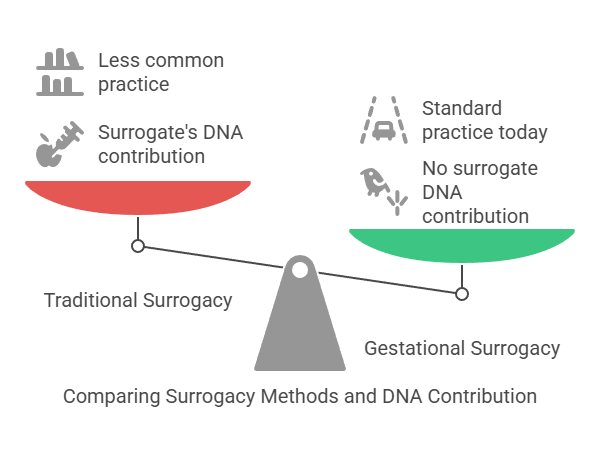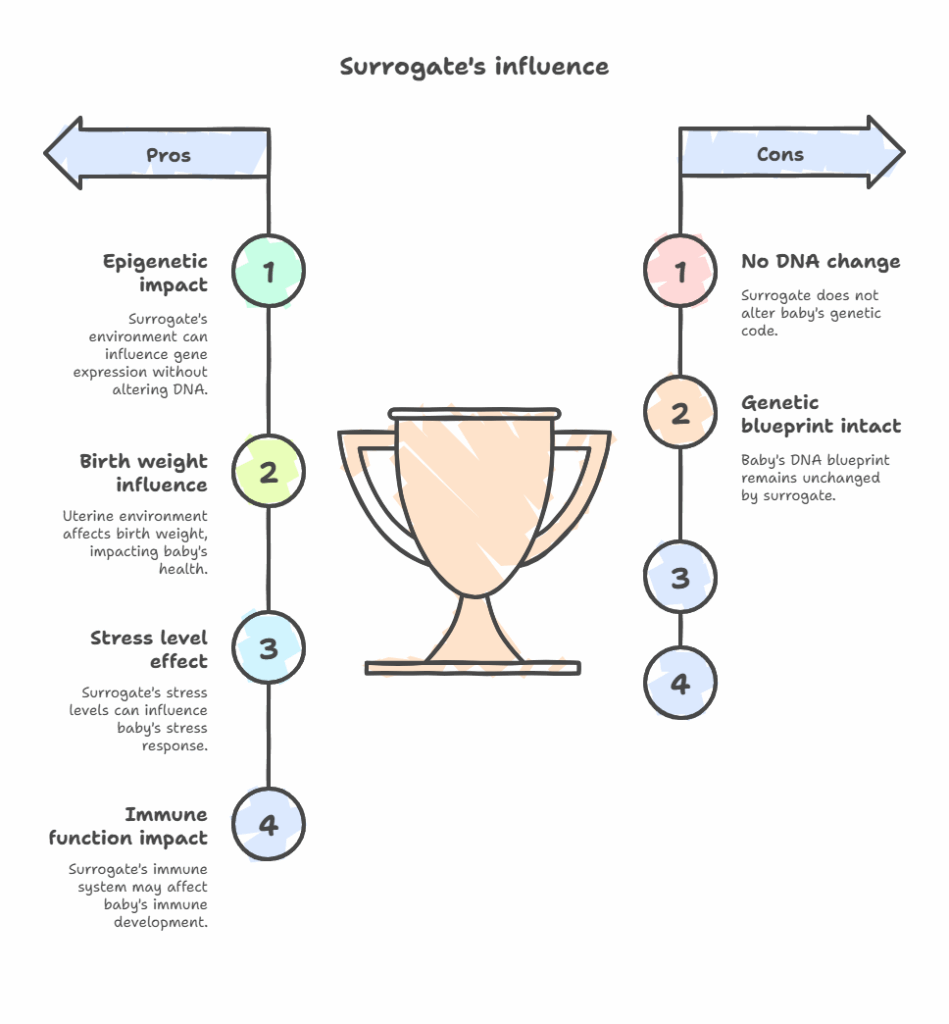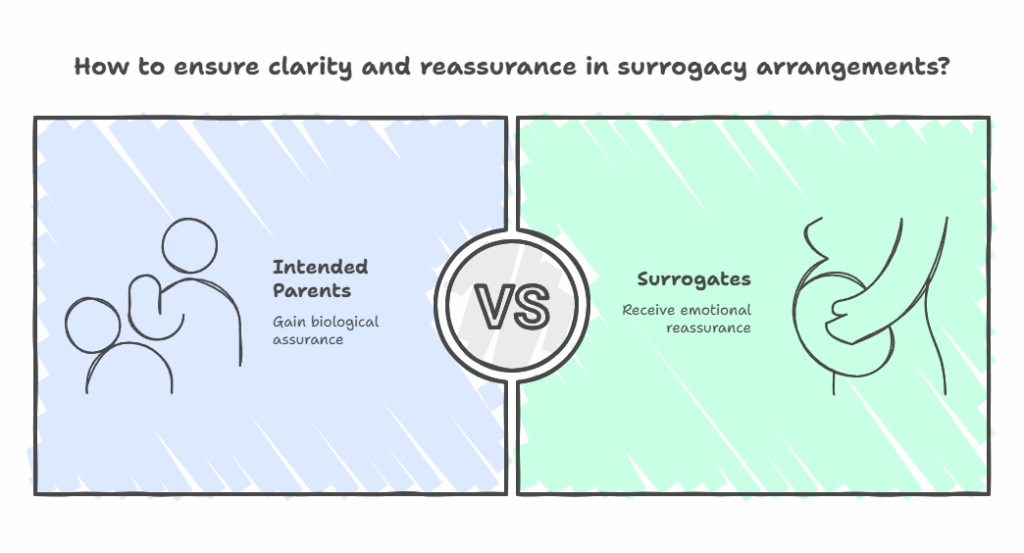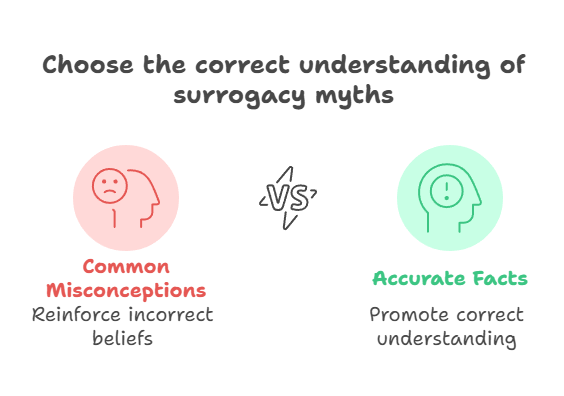No, a gestational surrogate does not pass on DNA to the baby. In almost all modern surrogacy arrangements, the surrogate is not genetically related to the child she carries. This is one of the most common and important questions asked by intended parents and potential surrogates alike — and it stems from a natural curiosity (and concern) about genetics, biology, and what makes a family.
Let’s break down exactly why the answer is no, and where the confusion comes from.
More: How Much Does It Pay to Be a Surrogate?
Understanding Surrogacy: Two Main Types
Before diving deeper, it’s essential to understand that there are two types of surrogacy, and the difference between them matters a lot when discussing DNA.
1. Traditional Surrogacy
In this older and far less common type of surrogacy, the surrogate uses her own egg. That means she is both the biological and gestational mother of the child. Sperm from the intended father (or donor) is used to fertilize the egg, usually via artificial insemination.
Because the surrogate’s egg is involved, she does pass on her DNA to the child in traditional surrogacy. However, due to emotional, ethical, and legal complexities, this method is rarely practiced today, especially through reputable agencies.
2. Gestational Surrogacy (The Standard Today)
In contrast, gestational surrogacy involves using an embryo created via in vitro fertilization (IVF). The egg comes from the intended mother or a donor, and the sperm from the intended father or a donor. The resulting embryo is then transferred into the surrogate’s uterus.
In this case, the surrogate is simply the carrier — not the biological mother. She does not contribute her egg, and therefore, she does not pass on any DNA to the baby.
Today, nearly all surrogacy in the U.S., Canada, and most other countries is gestational surrogacy.

What About the Womb’s Influence? (Epigenetics)
This is where things can get a little more nuanced — and interesting. Even though a surrogate doesn’t contribute DNA, some people wonder whether her body can influence the baby in other ways.
The answer lies in a field called epigenetics — the study of how environmental factors can affect gene expression. In simple terms, while a surrogate does not alter the DNA, the uterine environment she provides may impact how certain genes are turned “on” or “off.” This can influence things like birth weight, stress levels, and even immune function. But again, this doesn’t change the baby’s genetic code — the DNA still comes entirely from the egg and sperm providers.
It’s a bit like this: the surrogate provides the “house” for the baby to grow in, and while that house may impact how the baby develops, it doesn’t rebuild the child’s DNA blueprint.

Legal and Emotional Reassurance
Understanding that a surrogate doesn’t pass on DNA can bring a lot of relief — and clarity — for both intended parents and surrogates.
- For intended parents, especially those using their own genetic material, this means the child is fully theirs biologically.
- For surrogates, it reassures them (and their families) that they are not “giving up” their own child, because the baby is not genetically theirs to begin with.
Every gestational surrogacy arrangement is backed by a detailed legal agreement that clarifies parental rights and responsibilities before the pregnancy begins. This ensures that both parties are protected and fully informed.
More: What Disqualifies You from Being a Surrogate? Key Requirements and Exclusions

Clearing Up Common Myths
Let’s quickly address a few common misconceptions:
- ❌ “The baby will look like the surrogate.”
➤ Not in gestational surrogacy. The baby’s appearance is based on the genetics of the egg and sperm providers. - ❌ “The surrogate might want to keep the baby.”
➤ Legally and emotionally, gestational surrogates know they are helping someone else’s family grow — they are not “giving up” a child they biologically created. - ❌ “The surrogate must use her own egg.”
➤ Not true. Professional agencies exclusively use gestational surrogacy, where the egg comes from the intended mother or a donor.

Conclusion: DNA Comes from Egg and Sperm — Not the Surrogate
In gestational surrogacy — the method used in nearly all modern surrogacy journeys — the surrogate does not pass on DNA to the child. She is the amazing woman who helps carry the pregnancy safely and lovingly, but the baby’s genetic blueprint comes from the people who provided the egg and sperm.
If you’re considering surrogacy — either as an intended parent or a potential surrogate — knowing the science behind it is empowering. It brings clarity, confidence, and peace of mind as you move forward on this life-changing journey.
💡 Want to Learn More?
We’re here to answer all your questions with compassion and clarity. Reach out today or explore more in our Surrogacy Education Center.




